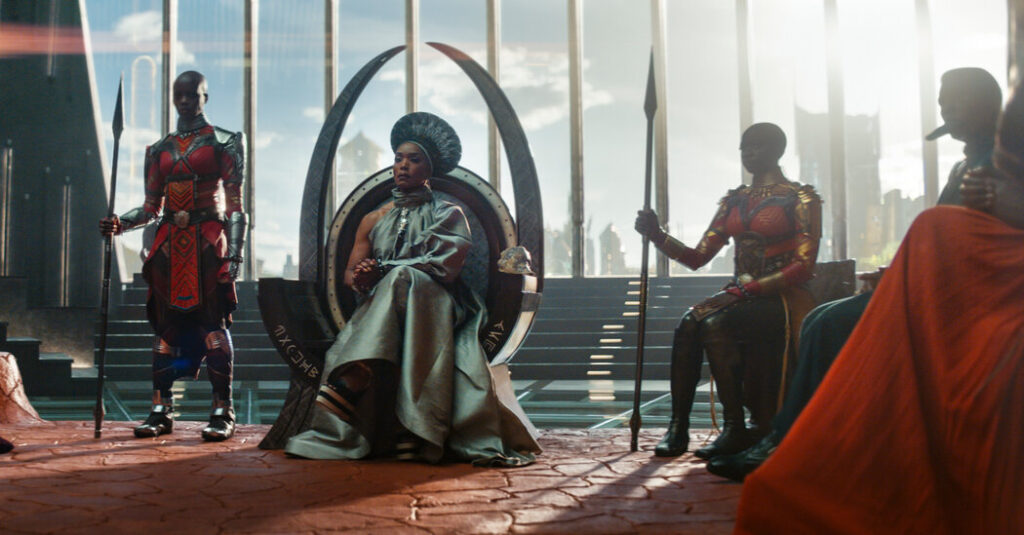
The first “Black Panther” movie opened in February 2018. A lot has changed since then, both in the Marvel Cinematic Universe and in the one that most of us non-superheroes are compelled to inhabit.
The most tragic and consequential change was surely the death, in 2020, of Chadwick Boseman, whose performance as King T’Challa had seemed to signal the arrival of a franchise-defining new star. Even before that, the Marvel/Disney corporate strategy was shifting into a post- “Avengers” phase, as the familiar heroes were dispersed into a multiplatform multiverse of stories, sometimes joined by alternative versions of themselves. And of course, here in the real world…
Let’s not even go there. The political situation in the fictional African nation of Wakanda is complicated enough. In “Black Panther: Wakanda Forever,” the director Ryan Coogler feeds his own and the public’s grief into the story, infusing the movie with somber notes of family loss and collective mourning. There is also a sense of the disorder that follows in the wake of a charismatic, unifying leader.
T’Challa’s mother, Queen Ramonda (Angela Bassett), has assumed the throne, at least for the moment. His younger sister, the scientific prodigy Shuri (Letitia Wright), scrambles to honor her brother’s memory and fill his shoes. The center is holding, but the kingdom nonetheless seems vulnerable, as the outside world conspires to gain access to Wakanda’s reserves of vibranium, a rare mineral with daunting military and industrial uses. The benevolent global order that T’Challa led his nation into has given way to one based on deceit, subversion and exploitation.
Thanks to Ramonda’s regal diplomatic skills and the fighting prowess of the Jabari, led by M’Baku (Winston Duke), and the Dora Milaje, led by the mighty Okoye (Danai Gurira), Wakanda can hold its own against the United States and France. The real threat comes from under the sea, where the long-isolated aquatic nation of Talokan controls the planet’s only other source of vibranium.
Return to Wakanda
“Black Panther: Wakanda Forever,” directed by Ryan Coogler and starring Letitia Wright and Lupita Nyong’o, arrives in theaters on Nov. 11.
The king of Talokan, who goes by Namor (Tenoch Huerta Mejía) is a demigod with pointy ears and wings on his ankles. Comic-book fans will recognize him as the Sub-Mariner, a complicated hero whose pedigree stretches all the way back into late-1930s Marvel prehistory. For the purposes of “Wakanda Forever,” he is a villain, albeit one with a legitimate grudge and a coherent political argument.
His subjects are descendants of a Meso-American tribe who took to the water to escape Spanish colonizers in the 16th century. His mistrust of “the surface” is based on a history of enslavement, infection and persecution, and he proposes a mutually protective anti-imperialist alliance with Wakanda. Which sounds nice, except that the alternative Namor offers is war, and also the murder of Riri Willliams (Dominque Thorne), a precocious M.I.T. student who has invented a vibranium-detecting machine.
If this sounds like too much plot summary, that’s because “Wakanda Forever,” like many Marvel movies, has too much plot. There are a lot of characters to keep track of. Shuri has acquired a sidekick in the person of Riri, while Okoye has one in Aneka (Michaela Coel). The Wakanda-sympathizing C.I.A. man Everett Ross (Martin Freeman) is back, and spends some time squabbling with his boss (Julia Louis-Dreyfus), who is also his ex-wife. Since this is, above all, a special-effects-heavy action movie, there are fistfights, vehicle chases, underwater and midair battles, high-tech suits and seat-rattling explosions.
A Marvel movie, for sure. But a pretty interesting one, partly because it’s also a Ryan Coogler film, with the director’s signature interplay of genre touchstones, vivid emotions (emphasized by Ludwig Goransson’s occasionally tooth-rattling score) and allegorical implications. Because the Avengers have, for the moment, disassembled, it’s no longer necessary to slot Wakanda and its heroes into a larger cosmic ensemble, which gives the busy narrative a welcome degree of focus and specificity. As in “Black Panther,” the questions of Wakandan identity — who will lead it, and what kind of a country will it be — are brought into relief by an apparent bad guy with a good or at least plausible answer.
Namor has in common with T’Challa’s nemesis Killmonger (Michael B. Jordan) — and also with Magneto from the X-Men films and Koba from the first chapters of “Planet of the Apes” — a grievance-based radicalism that the movie struggles to refute. Huerta’s performance is weighted more with sorrow than anger, and his people, with their blue skins and gill-like masks, are beautiful and mysterious. Talokan, a kind of Mayan Atlantis, adds a new aesthetic element to the Marvel palette, extending the Afro-futurist visions of Hannah Beachler’s production design and Ruth Carter’s costumes into something wondrously cosmic and cosmopolitan.
In T’Challah’s absence, Wakanda has become, at least for the moment, a matriarchy, and “Wakanda Forever” displays a matter-of-fact superhero feminism grounded in the personalities of the performers and their characters. Bassett, Wright, Gurira, Williams and Coel — rejoined by Lupita Nyong’o as Nakia, who shows up a bit late in the action — form the kind of fractious, formidable ensemble that should be a franchise in its own right. And quite possibly will be. It’s called “Wakanda Forever,” and in the Marvel Universe that sounds less like a slogan than a terms of service guarantee.
Black Panther: Wakanda Forever
Rated PG-13. The usual bloodless comic-book slaughter. Running time: 2 hours 41 minutes. In theaters.
You may also like
-
Interview with Gui Pimentel and Rodrigo Duarte
-
Celebrating Diversity and Excellence: Mrs Universal Empire’s International Gold Awards Ceremony in Muscat
-
Ari Kim: Crafting Cinematic Tales in the Heart of NYC
-
Mike Mizzle: The Rising Star Taking Social Media by Storm!
-
Jose Comelon: The Giant of Children’s Content, Number 1 on Netflix!

